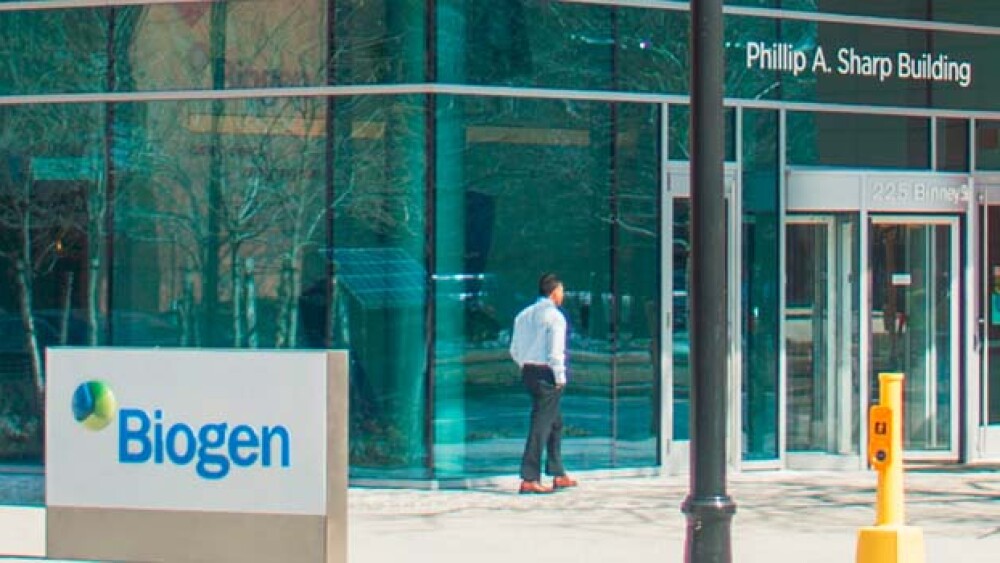After a huge dry spell in M&A, 2018 is shaping up to be a great year for deal making.
‘Tis the season for biotech matchmaking! After a huge dry spell in M&A, 2018 is shaping up to be a great year for deal making. And while predicting future match-ups is generally fool’s errand, I can’t help but be intrigued by the dance between multiple sclerosis powerhouse Biogen and drug delivery specialist Alkermes. In particular, I’m still wondering about a deal hatched last autumn that gave Biogen rights to ALKS8700—now named BIIB098—and what it might say about the future.
This drug was being developed by Alkermes as an alternative form of the multiple sclerosis blockbuster Tecfidera. Specifically, it was being developed under the 505(b)(2) pathway, which means Alkermes was referencing much existing data on Tecfidera, arguing that their version used a familiar active ingredient. Tecfidera is dimethyl fumarate, while ALKS8700/BIIB098 is a prodrug of monomethyl fumarate (MMF). Both are quickly converted to MMF in the body, so what’s a methyl group, give or take? It looked, at least to the casual observer, like a clever strategy to make a generic Tecfidera while circumventing some IP issues.
And the stakes are huge. Tecfidera is far and away Biogen’s top-selling drug, bringing in 2017 sales of $4.2 billion. Alkermes’ program looked like a quiet but potentially devastating threat to Biogen’s bread-and-butter MS franchise.
So why, when it came down to it, did Alkermes give Biogen exclusive worldwide rights to the drug in exchange for mid-teen royalties, a maximum of $200 million in milestones, and some development reimbursement? It didn’t seem like a great deal for Alkermes.
But I think it came down to a few things. One is the argument over whether ALKS8700/BIIB098 is essentially generic Tecfidera, or whether it is really a new chemical entity. FDA has always been a little wishy washy about this determination when it comes to prodrugs, sometimes going one way or the other, sometimes reversing itself later.
A 2014 study in the journal Neurology argued that dimethyl and monomethyl fumarate have very different pharmacodynamic behavior in the body, and that the latter “cannot be considered simply, or only as a prodrug of MMF, as it has distinct pharmacological properties.” But since this study was funded by Biogen and conducted by Biogen employees, it seemed more like a political argument against approving ALKS8700/BIIB098 through the 505(b)(2) pathway.
Turns out, Biogen may have seen more going on here. The company is now excited about developing the drug as an alternative to Tecfidera—one that could have a better tolerability profile, particularly around GI effects. And if it turns out to also have even modestly improved efficacy, it will be a huge home run for Biogen.
Biogen successfully defended a key patent on Tecfidera this past summer against a suit brought by lawyer-turned-drug-patent-warrior Kyle Bass, theoretically ensuring protection through 2028. But in truth, Tecfidera may still be vulnerable—potentially as soon as 2021, if other challengers can invalidate a single patent. Biogen has a serious interest in hedging its bets, and ALKS8700/BIIB098 has exclusivity through 2033.
So how did it leverage such a strong deal with Alkermes? The company may have made the case that Alkermes was unlikely to get far on its own with a drug that Biogen could probably delay and then massively outmarket with its own sales force. Biogen could have potentially forced them to generic-like pricing and margins, making a mid-teens royalty look relatively attractive.
Moreover, this may be a case of two companies being stronger together. Alkermes and Biogen have both become CNS companies. Beyond the overlap in multiple sclerosis, Alkermes’ focus on addiction, depression, and schizophrenia could broaden and de-risk Biogen’s own focus on Alzheimer’s (a highly speculative area) and other neurodegenerative diseases. It could also allow Biogen to follow in the footsteps of blue chip competitor Amgen by having an arm dedicated to lower-risk products—not biosimilars, in this case, but royalty-bearing versions of drugs with enhanced delivery properties.
Perhaps most importantly, as we saw from last autumn’s deal on ALKS8700, Biogen has shown its very interested in extending patient life—the business on which Alkermes built itself. It certainly may not happen, but it could be one of the more intriguing biotech match-ups.





